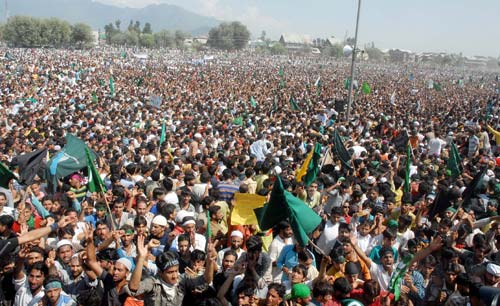by Jahangir Raina
It is that time of the year when people are thinking about filing their returns. I am busy working on mine, auditing each little transaction and finalizing my accounts. On a collective basis, we work out our GDPs and other economic indicators. Those are proceeds from economic activities. Then there are proceeds of larger value and meaning which we assess from time to time: what one has lost and gained. Nations and communities who have sound and rational constituents do such assessment at a collective level on a routine basis. I want to do some maths along these lines today.

We have hardly carried out any objective assessment of the period that affected us the most: the years of Tehreek. It has almost become a taboo to talk about results from Tehreek. Let us break the taboo and commit the sacrilege today. What we have invested in Tehreek in terms of time, wealth and young lives far outweigh the condescending sense of sacrilege.
Over the last three decades, what have we gained and what have we lost? Let us deal only with those two accounting heads for a while: Losses and Gains. Start with the losses first. Over the last three decades, we lost innumerable lives. People got displaced and we suffered a brain drain. Our economy got shattered and we lost our self-sufficiency. We lost a multi-cultural society. The security apparatus strengthened its ominous grip over us. All bad stuff, and all attributable to separatist politics. Let us be candid about it.
Let us talk about the pleasant stuff now: the gains. Surprisingly, many good things happened during the last three decades of turmoil, a fact that has baffled many. Our levels of education and basic literacy have admittedly gone up. Connectivity has improved: Whether it is the number of passenger jets flying into the valley or the promised train; from roads connecting remote parts to the ubiquitous Sumos that run those roads, ferrying people who never travelled before even to the very next district; from the flyovers to the momentous and iconic opening of Muzaffarabad Road which symbolizes our longing to reach out and connect. Telecom connectivity has grown beyond the privileged sections of the society and advanced from rotary-dial days to 4G access in the remotest parts of the valley.
A few more things have happened that has put a smile on our faces. Consumer options have considerably increased and with increased purchasing power that has transformed consumer experience. We should be proud to have enabled women empowerment despite the doom and gloom of conflict hovering over us. Increased women participation in public services is something to celebrate. Electing a woman chief minister was a milestone in that regard. It is a different matter if she subsequently did justice to that milestone. The other thing to celebrate is the upliftment of rural Kashmir over the last three decades. The empowerment and transformation of rural Kashmir is a great example for the world to study. Today rural Kashmir is a major stakeholder in the state affairs and exercises great influence in public services, business, and politics. So, the gains over the last three decades – the Tehreek years – have been substantial.
While the losses enumerated above are mostly attributable to separatist politics, what can one attribute the gains to?
No, I am not attributing them to elected governments and mainstream politics in the state. Most of these gains materialized from the trickle-down effect of economic liberalization during the nineties as India opened up its economy. I don’t think the gains are correlated to the resumption of electoral democracy in Kashmir which happened in 1996. But the ‘mainstream’ that was revived in the process pretty much orchestrated that trickle-down effect and acted as gatekeepers of this positive transformation that took place in the state post liberalization. By default, that is the job description the mainstream assumed. Between 1990 and 1996, the only trickle-down was the limited redistribution of Hawala money among the shady islands of the economy.
Crude as the above maths may seem, it tells us that losses are mostly attributable to boycott politics of separatists while all the gains are orchestrated by the mainstream.
Here is some more maths. We know that losses far outweigh the gains. We know that we are collectively running a loss-making enterprise. But we also know that while mainstream has been an agent of forward movement, it is also a collaborator in inflicting some of the losses enumerated above –whether directly or indirectly. Separatist politics may sound like a one way street to ruination, but mainstream with its capability to inflict both harm and benefit is a tough cookie to handle. There was an anecdote we used to read in our Urdu textbooks during primary school. The title read ‘usi say thanda, usi say garam’ narrating a story about a boy who felt confused about how one’s breath could be a source of both warm and cold air. That is what encapsulates our mainstream politics today.

As we close our books of accounts for now and conclude our cursory maths, reason demands that we explore ways to plug our losses and boost our gains. That can, in theory, be achieved by retrenching boycott politics and simultaneously creating a collaborator-free mainstream. That can, in theory, be achieved by electing people who are laser-focused on development and jobs instead of opportunism and cronyism. In theory that is the recipe for fixing our lopsided maths equation. It is the way the cookie crumbles. What is happening in practice is that we are, once more, gravitating towards self-affliction and perpetual loss. We not only mourn our loss, we glorify it. We willingly extend all our political space to endeavours that yield zero results. That is a state of emotion, not dispassionate reason. The math inevitably fails. It fails for no fault of ours, mind you! The provocation is unprecedented and the mainstream – the gatekeeper to bright spots – is at its lowest ebb.
(Jahangir Raina is an entrepreneur and has served in civil society and business forums. Forums served to include ICT Association of J&K, J&K State IT Task Force, and State Level Empowered Committee for setting up incubation centres within colleges. Prior to his entrepreneurial career, Jahangir worked as a Telecoms Analyst. Ideas expressed in this piece are his own.)
Scroll the Debate here















